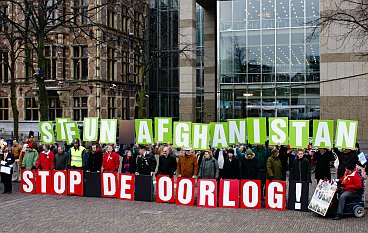Foresight: Afghanistan
Foresight: Afghanistan
Slowly but surely it’s getting through to the US and NATO that this war cannot be won, and that talking with the Taliban would be preferable. The Taliban cannot be combated militarily. That the war has not delivered what was anticipated in 2001 is now acknowledged.

'Support Afghanistan, stop the war' - an SP action in 2007
In October of that year the US, supported by NATO, attacked the Taliban regime on the grounds that it was offering a safe haven to Al Qaeda, whose training camps were located in the mountainous east of Afghanistan. On 11th September 2001, the infamous attacks on the US took place. Al Qaeda leader Osama bin Laden claimed responsibility. A month after the attacks on the Twin Towers the US launched its war against the Taliban government in Afghanistan and their Al Qaeda allies in the mountainous region bordering Pakistan.
The SP had its doubts from the word go as to whether violence would solve the problem, as spokesman Harry van Bommel’s statement of 19th September 2001 demonstrates:
‘You don’t defeat a holy war by starting one yourself. With the application of Article 5 of the NATO treaty, the US President has furnished himself with a pretext to hit back hard and to involve allies. It is only a question of time before the consequences of this become visible.’
During the parliamentary debate of 9th October 2001, SP leader at the time Jan Marijnissen had this to say about the new war:
‘I don’t want to leave any room for misunderstanding. We have nothing good to say about the Taliban. The Taliban’s support for Osama Bin Laden we repudiate, and the same goes for Bin Laden himself, his deeds and his groups. The question is only whether the international community’s response, as things stand, should consist of the bombing of a country that in reality is still living in the middle ages, plunging it thereby into the stone age.’
The SP is the only political party which, from the beginning, has opposed the war unleashed on Afghanistan by the US and NATO.
The Taliban government was quickly removed. But the Taliban fought back, coming to dominate the south. More and more was demanded from NATO member states, including our own country, in the struggle against them. In 2005 Dutch marines and commandoes were dispatched to the province of Kandahar, and in 2006 Dutch soldiers were deployed in Uruzgan.
On a trip through Afghanistan and Pakistan in 2007, Harry van Bommel saw with his own eyes much that confirmed our suspicions:
‘The struggle against the Taliban cannot be won militarily. A large part of the Taliban’s support is quite moderate, and open to negotiation. The use of brutal violence has meant that this moderate wing has elected to support the relatively small group of radicals seeking to come to power in a violent manner.’
Since then a decision has been taken to withdraw the Dutch troops. Many other countries are taking the same decision, and now even the US had begun its withdrawal. Our country is nevertheless sending a so-called police mission to Kunduz, in the north.
It turned out that the US and NATO could not and cannot win against the guerrilla methods of the Taliban. Now, after the death of Bin Laden and the enormous pressure in the US itself to find better ways to spend scarce financial resources, the American government too can see that negotiation is the only option. This realisation apparently required ten years of war with many, many billions in costs and, still more importantly, an immense amount of human suffering.
